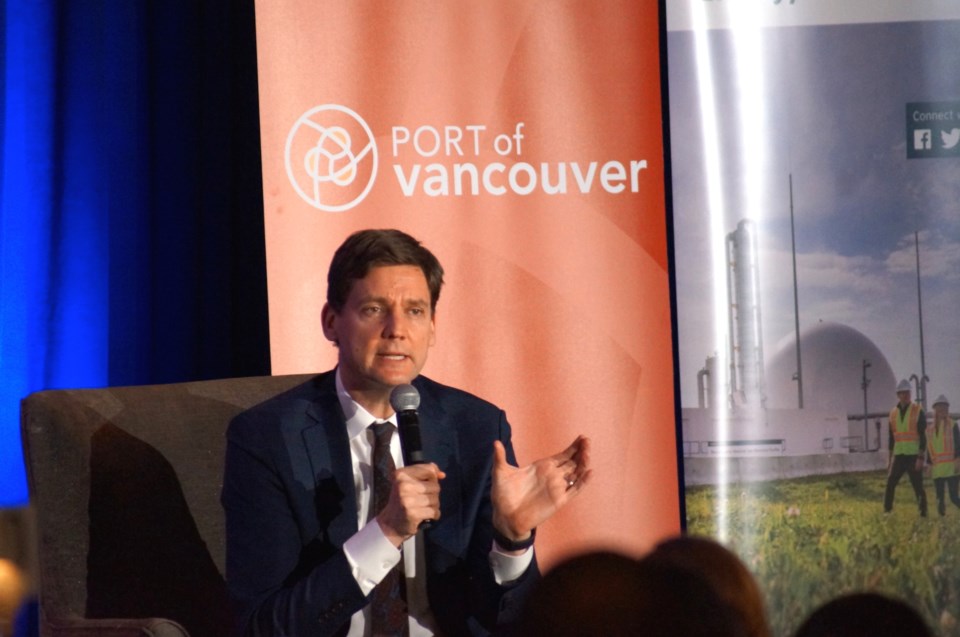B.C. ports remain unmanned by a federal police force as fentanyl precursor chemicals flood in from overseas resulting in British Columbians dying at an extraordinary rate.
In the wake of a bi-partisan U.S. Congress report revealing “the Chinese Communist Party’s role in the deadly fentanyl epidemic,” B.C. Premier David Eby suggests the Canadian government needs to play a stronger role in tackling the province’s illicit drug toxicity public health emergency from the top down.
“We need to ensure that the ports are adequately policed, the airports have the support they need to intercept precursor chemicals. And we do need the federal government to continue to expand their efforts to address this issue,” said Eby, when asked by Glacier Media for his thoughts on the report with respect to B.C.
The report stated “fentanyl kills over 200 Americans daily, the equivalent of a packed Boeing 737 crashing every single day.”
In B.C., toxic street drugs are killing about seven people per day and six of those deaths (or 85 per cent in 2023) involve fentanyl.
This means B.C.’s death rate related to fentanyl alone is roughly twice that of the United States, factoring in each jurisdiction’s population.
What’s more, the report concludes the People’s Republic of China is not holding up its end of enforcing international bans on production and export of chemical precursors that produce fentanyl.
“Beyond the United States, fentanyl and other mass-produced synthetic narcotics from the People’s Republic of China (PRC) are devastating nations around the world. It is truly a global crisis.
“The PRC, under the leadership of the Chinese Communist Party (CCP), is the ultimate geographic source of the fentanyl crisis. Companies in China produce nearly all of illicit fentanyl precursors, the key ingredients that drive the global illicit fentanyl trade.”
China is subsidizing this production through tax rebates and fails to prosecute precursor manufacturers, some of whom are controlled by state companies tied to drug traffickers and Chinese organized criminal organizations, the report by the Select Standing Committee on the CCP alleged.
“We raised specifically the issue of precursor chemicals coming into British Columbia, with the prime minister, with the federal government, with a public safety minister,” Eby told Glacier Media April 18.
“It’s a repeated concern that we've raised. We understand that both fentanyl as well as precursors are coming through our ports, some from Mexico, some from China. But regardless, coming across the border in British Columbia,” added Eby, who went on to state some of the steps his government is taking to crack down on organized crime and illicit proceeds of crime, such as through unexplained wealth orders and a beneficial ownership registry around real estate.
“But we need a strong federal partner on these issues,” said Eby.
In B.C., federal ports have no dedicated federal police and a , home to the province’s largest container terminal, indicates there is de facto little to no law enforcement presence.
“It's a very serious issue in British Columbia and we don't want to be the place, in Canada, where these chemicals are assembled into illegal drugs and we're certainly seeing the death toll here for British Columbia and it's expanding right across the country,” said Eby.
“If we can prevent those chemicals from coming in we can go some distance preventing drugs from ending up on the street,” added Eby.
According to the Globe and Mail last week, Deputy Minister of Foreign Affairs David Morrison “planned” to discuss fentanyl production on a mission to Beijing April 18.
Global Affairs spokesperson Charlotte MacLeod would not confirm those discussions took place.
“David Morrison, Deputy Minister of Foreign Affairs of Canada, travelled to Beijing, China, for a high-level visit from April 18 to 19. During his visit, Deputy Minister Morrison met with Ma Zhaoxu, Executive Vice-Minister of Foreign Affairs of China,” stated MacLeod, via email, in entirety.
Morrison’s visit comes as the federal at a public inquiry that it is not addressing foreign interference by China nor willing to establish a foreign agents/lobbyist registry.
Unlike in Canada, the U.S. State Department issues an itinerary of its foreign trips and on April 19 the department held a press conference acknowledging fentanyl production being on the agenda for Secretary of State Anthony Blinken’s own visit to China April 24-26.
“Obviously, the Secretary will be prepared to raise this issue as one of the most important issues on the U.S.-China agenda today, both because of the incredibly harmful impact that fentanyl and these — and the role that chemical precursors play in the synthetization of fentanyl and what that means,” stated the department’s spokesperson.

